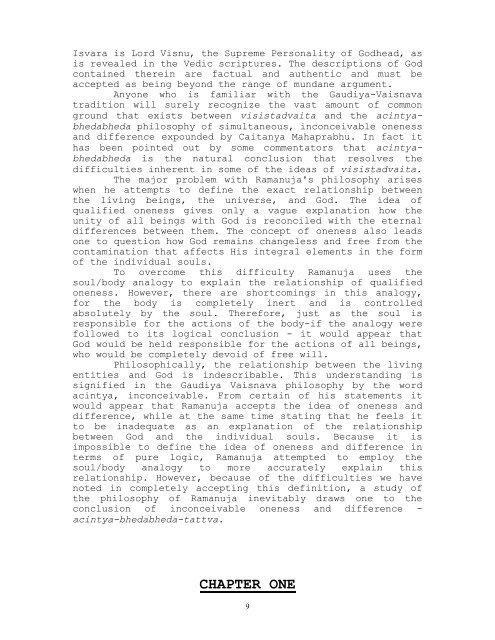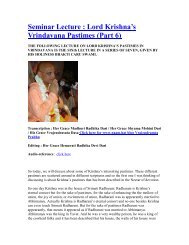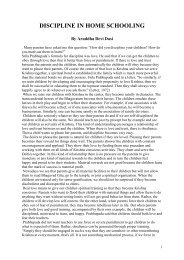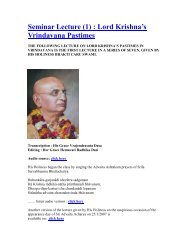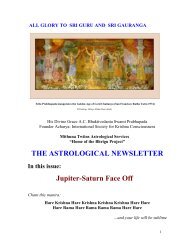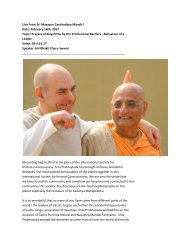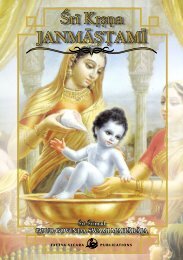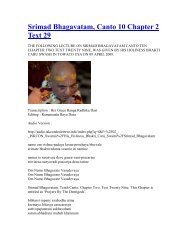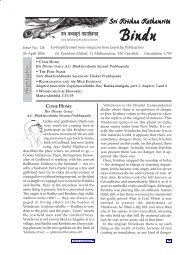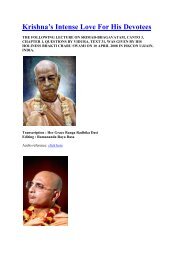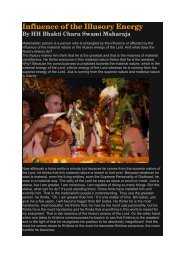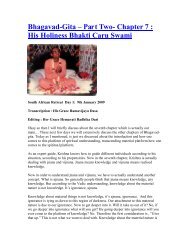Isvara is Lord Visnu, the Supreme Personality of Godhead, asis revealed in the Vedic scriptures. The descriptions of Godcontained therein are factual and authentic and must beaccepted as being beyond the range of mundane argument.Anyone who is familiar with the Gaudiya-Vaisnavatradition will surely recognize the vast amount of commonground that exists between visistadvaita and the acintyabhedabhedaphilosophy of simultaneous, inconceivable onenessand difference expounded by Caitanya Mahaprabhu. In fact ithas been pointed out by some commentators that acintyabhedabhedais the natural conclusion that resolves thedifficulties inherent in some of the ideas of visistadvaita.The major problem with Ramanuja's philosophy ariseswhen he attempts to define the exact relationship betweenthe living beings, the universe, and God. The idea ofqualified oneness gives only a vague explanation how theunity of all beings with God is reconciled with the eternaldifferences between them. The concept of oneness also leadsone to question how God remains changeless and free from thecontamination that affects His integral elements in the formof the individual souls.To overcome this difficulty Ramanuja uses thesoul/body analogy to explain the relationship of qualifiedoneness. However, there are shortcomings in this analogy,for the body is completely inert and is controlledabsolutely by the soul. Therefore, just as the soul isresponsible for the actions of the body-if the analogy werefollowed to its logical conclusion - it would appear thatGod would be held responsible for the actions of all beings,who would be completely devoid of free will.Philosophically, the relationship between the livingentities and God is indescribable. This understanding issignified in the Gaudiya Vaisnava philosophy by the wordacintya, inconceivable. From certain of his statements itwould appear that Ramanuja accepts the idea of oneness anddifference, while at the same time stating that he feels itto be inadequate as an explanation of the relationshipbetween God and the individual souls. Because it isimpossible to define the idea of oneness and difference interms of pure logic, Ramanuja attempted to employ thesoul/body analogy to more accurately explain thisrelationship. However, because of the difficulties we havenoted in completely accepting this definition, a study ofthe philosophy of Ramanuja inevitably draws one to theconclusion of inconceivable oneness and difference -acintya-bhedabheda-tattva.CHAPTER ONE9
YAMUNACARYAIn the south of India many great devotees haveappeared to spread the glories of the Lord. Of all thesedevotees, perhaps the most famous is Sri Ramanujacarya,whose life is the subject of this book. However, just beforeRamanuja there lived another great Vaisnava whose life andteachings had a tremendous influence on Ramanuja, althoughin fact the two of them never met. This was Sri Yamunacarya,also known as Alabandara - "The Conqueror." It isappropriate in considering the life of Ramanujacarya that weshould first look briefly at this great soul, theillustrious writer of the famous Stotra-ratna.Yamunacarya was born around AD 918 in the city ofMadurai in south India, which was then the capital of themighty Pandya kings. His grandfather was a well-knownscholar and devotee known as Nathamuni, who was also famousfor his mystic abilities and expertise in the practice ofastanga yoga. It was Nathamuni who first compiled the songsof Nammalvara, a famous south Indian devotee, and had themset to music.Nathamuni's son was a handsome, intelligent young mannamed Isvaramuni, who married a beautiful young wife.Shortly after the wedding, Isvaramuni traveled with his wifeand parents to visit the holy places of pilgrimage innorthern India, including Vrndavana, the birthplace of LordKrsna. Just a few months after their return from thispilgrimage, Isvaramuni's wife gave birth to a baby boy, and,in memory of the sacred river which flows through Vrndavana,Nathamuni named him Yamuna.However, the joy of the young couple was but shortlived,for just a few years after the birth of the childIsvaramuni passed from this world, leaving his young wife awidow.Nathamuni was so distressed by the untimely death ofhis son that he decided to have no more to do with theaffairs of this world. He left his wife and relatives totake up the life of a renounced sannyasi, totally dedicatinghimself to the worship of Lord Visnu. Thus at a very youngage Yamunacarya was left to be brought up by his mother andaged grandmother, living a life of great poverty.THE CHALLENGEWhen he was five years old, Yamunacarya went to studyat the school of Bhasyacarya and quickly won his teacher'saffection, both for his sweet nature and his ability tolearn quickly. He studied hard, and by the time he wastwelve years old he was Bhasyacarya's best student.10
- Page 1 and 2: The Life ofRamanujacaryaTABLE OF CO
- Page 3 and 4: egan to learn the wonderfully instr
- Page 5 and 6: Ramanuja. Despite some minor philos
- Page 7: For the devotees, Hi manifests His
- Page 11 and 12: furious rage to inform his teacher
- Page 13 and 14: and faithful to her husband as was
- Page 15 and 16: that there was little chance of his
- Page 17 and 18: all the pleasures of my worldly lif
- Page 19 and 20: with his wife to the temple of Sri
- Page 21 and 22: THE FIRSTCONFRONTATIONOne day when
- Page 23 and 24: "Sir, surely you could just forbid
- Page 25 and 26: quickly dispelled all the misgiving
- Page 27 and 28: shrine of the Saivites and dedicate
- Page 29 and 30: was on everyone's lips. Yadavapraka
- Page 31 and 32: Having given this advice to the you
- Page 33 and 34: ahmanas were from Kancipuram, he im
- Page 35 and 36: "My master wishes to see you, and i
- Page 37 and 38: long periods he would remain alone,
- Page 39 and 40: KANCIPURNA'S VISIT TO TIRUPATIMeanw
- Page 41 and 42: ‘All of you may recall how, just
- Page 43 and 44: departed for Sri Rangam. While Maha
- Page 45 and 46: RAMANUJA BEGINS HIS TEACHINGAll the
- Page 47 and 48: Seeing the devotional sentiments in
- Page 49 and 50: When the discourse was completed an
- Page 51 and 52: To this the priest replied, "You do
- Page 53 and 54: to your words, so many people are n
- Page 55 and 56: DASARATHI'S HUMILITYDasarathi then
- Page 57 and 58: great attention. When he heard Rama
- Page 59 and 60:
ADOPTING THE WAYS OF ROBBERSBeing a
- Page 61 and 62:
of the huge boat as it moved slowly
- Page 63 and 64:
THE PRIEST'S REPENTENCEHowever, in
- Page 65 and 66:
he walked over to the monastery whe
- Page 67 and 68:
make a flower garden and serve Lord
- Page 69 and 70:
However, when he heard about the wo
- Page 71 and 72:
offense, they all submitted a petit
- Page 73 and 74:
RETURNING TO KANCIAfter thus passin
- Page 75 and 76:
"That woman was singing the tales o
- Page 77 and 78:
However, that night as he was lying
- Page 79 and 80:
challenged by some of the local sch
- Page 81 and 82:
the birthplace of Nathamuni, Yamuna
- Page 83 and 84:
and so he and his wife were fasting
- Page 85 and 86:
from His temple, the throng of peop
- Page 87:
enclosed by walls on all sides, as
- Page 90 and 91:
considering him fallen, and that he
- Page 92 and 93:
and the other devotees also left th
- Page 94 and 95:
However, the atrocities that Kulott
- Page 96 and 97:
just by looking at the girl's face.
- Page 98 and 99:
festival days. This form of the Lor
- Page 100 and 101:
up her body. Being immersed in cont
- Page 102 and 103:
heard Lord Varadaraja speak to him
- Page 104 and 105:
take part in the festivities. Many
- Page 106 and 107:
At about the same time the devotees
- Page 108:
When Ramanuja had finished speaking


